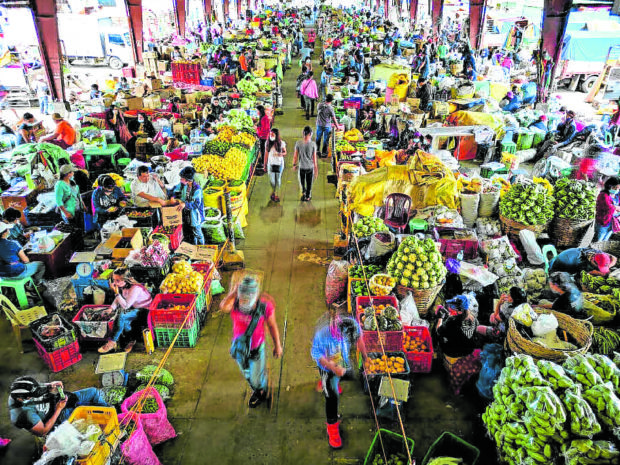
FRESHNESS OVERLOAD In this photo taken in October 2020, business at the vegetable trading post in the Benguet capital town of La Trinidad continues as assorted fresh produce are unloaded there daily for shipment to different markets in Baguio City, Metro Manila and other parts of the country. —EV ESPIRITU
BAGUIO CITY, Benguet, Philippines — An alliance of farmers’ groups in the Cordillera region wants stronger protection of local farmers as it blames the government’s trade liberalization policies for the rampant vegetable smuggling and importation of “cheap” and “unsafe” agricultural products.
In a statement on Monday, Alyansa Dagiti Pesante iti Taéng Kordilyéra (Apit Tako) said vegetable imports and smuggling had worsened farmers’ losses during the pandemic.
“In the past few years, the country usually experiences an influx of vegetables from China and other countries, both smuggled or legally imported, whenever the prices of local produce increase,” the group said.
It said when prices were down because of importation or low demand, local farmers were forced to dispose of their produce because these spoil quickly, unlike vegetables from China that were reportedly treated with preservatives.
About 58,000 households in Benguet, Ifugao and Mountain Province rely on vegetable farming as their main source of livelihood in 2020, according to the second quarter report of the Philippine Statistics Authority (PSA) this year.
The three provinces produced about 80 percent of the country’s highland vegetables while the entire region produced 130,538 metric tons of cabbage, potato, tomato, camote (sweet potato), cassava, eggplant and onion in 2020, the same PSA data showed.
In the same year, farmers in these upland provinces harvested 235,777 MT of habichuelas (beans), banana blossom, broccoli, cauliflower, kangkong, lettuce, pechay, peanut, string beans, gourd, okra, squash, ginger, pepper, carrots, gabi (yam), radish and garlic.
Top producer
Cordillera remains as the top producer of cabbage and potato, comprising 81 percent and 88 percent, respectively, of the country’s harvests, the PSA said.
According to Apit Tako, the liberalization of the rice market and response to the pork crisis showed that the government “prefers to import agricultural produce rather than assist local farmers and improve domestic production.”
“Even its [government] actions on vegetable smuggling are belated, haphazard, half-hearted and weak,” Apit Tako said.
In a separate statement on Tuesday, militant farmer’s group Kilusang Magbubukid ng Pilipinas (KMP) said the growing incidents of vegetable smuggling was the “direct consequence” of increasing importation.
TRADING HUB The La Trinidad Vegetable Trading Post is among the biggest job generators in Benguet province, giving livelihood opportunities even to porters, truckers and small vendors. —EV ESPIRITU
“Smuggling flows through the same processes and the same vessels as legal importation. Every time agricultural trade is further liberalized, technical smuggling—misdeclaration, undervaluation and misclassification—also becomes easier,” said Rafael Mariano, KMP chair emeritus.
Tracing source
But Agriculture Secretary William Dar, during an online press briefing on Sept. 28, vowed to confiscate all smuggled vegetables from China that had flooded the local market.
Dar said the government was already determining the source of smuggled vegetables that entered the country, adding that these would also be examined to ensure food safety.
Mariano had called on the Bureau of Customs (BOC) to go after large-scale vegetable smugglers and not just small retailers.
“Stalls just distribute. The ones who must be urgently caught and penalized are those who facilitate the entry of huge volumes of smuggled vegetables. The government should inspect warehouses, not just market stalls,” he said.
Mariano said the P4.8 million worth of smuggled carrots, garlic and other agricultural products seized by the BOC in Tondo, Manila, on Sept. 30 was just “the tip of a gigantic iceberg.”
“If three lowly stalls can sell such huge amounts of smuggled veggies, what more can warehouses sell?” Mariano asked.

